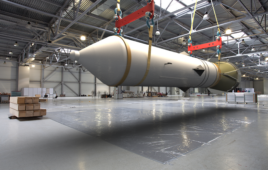The U.S. military has chosen to temporarily prohibit F-35 pilots weighing less than 136 pounds from flying an aircraft due to concerns those individuals are more susceptible to injury during ejections at low speeds, according to a report by Defense News.
Fear regarding the Martin-Baker manufactured seat arose in August after examiners found that pilots under 136 pounds were at enhanced risk of neck injury when flying at slower speeds. The restriction has been in place since Aug. 27, Joint Program Office Spokesperson Joe DellaVedova told Defense News. He said at least one F-35 pilot is influenced by the decision to place a weight restriction. DellaVedova added the change does not affect 33rd Operations Group Deputy Commander Christina Mau, who is the first and currently the only female F-35 pilot.
DelllaVedova said an F-35 ejection seat should be able to hold pilots that weight 103 to 245 pounds.
Maj. Gen. Jeffrey Harrigian, who directs the F-35 integration office, said that pilots under the weight won’t be allowed to resume flying the aircraft until the problem is completely solved.
“The bottom line is, they have to get into the realm where the seat allows that weight of a pilot less than 136 pounds [to] safely eject out of the airplane,” Harrigian said to Defense News. “They found some areas that particularly at slower speeds they were concerned about, so that drove the restriction that we have right now.”
The issue arises, according to the testers, when the ejection seat begins to marginally over-rotate under the more lightweight pilot, Col. Todd Canterbury told Defense News. Canterbury is the F-35 Integration Officer Operations Division chief. “The testers are worried that the over-rotation could take the pilot out of the ideal position when the parachute opens during the time of ejection.
“It’s that light pilot and the center of gravity of the seat,” said Canterbury. “It all has to do with getting that center of gravity kind of located within the window, we call it, for safe seat-man separation.”
According to Canterbury, Lockheed Martin, who manufactures the F-35, Martin-Baker, and the Joint Program Office are all laboring on permanent fix to the issue. He added that the weight restriction is nothing more than a short-term fix.
“Safety is our No. 1 concern and we want to make sure that we give the warfighter the safest ejection seat capable out there,” Canterbury said. “As we discover things, we can weigh the risk of what’s acceptable and what’s not, and right now, until we fully understand the implication of the seat, safety is our No. 1 priority.”
Filed Under: Aerospace + defense




